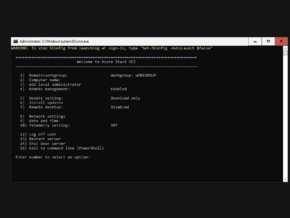Azure Local
 | |
| Initial release | Azure Stack HCI, version 20H2 (10 December 2020) |
|---|---|
| Latest release | Azure Local, version 23H2 (1 February 2024) |
| Supported platforms | AMD64 |
Azure Local (formerly Azure Stack HCI[1]) is a series of Windows Server-based operating systems that consist of a specialized version of the Server Core installation type that deploys and runs Windows and Linux virtual machines in a datacenter or edge devices using existing tools, processes and skill sets. It is primarily intended for hyper-converged infrastructure integration with the Microsoft Azure cloud service.[2] The series was first introduced in December 2020 after being announced on 21 July 2020.[2]
It is the spiritual successor of the free Hyper-V Server operating system, previously available in Windows versions prior to Windows Server 2022.
Servicing model[edit | edit source]
Azure Local uses an update scheme that is fundamentally similar to the Windows as a service model, where Microsoft would release feature updates to the operating system after a yearly development cycle. Updates are delivered to the operating system on a monthly cadence.[3]
List of feature updates[edit | edit source]
| Name | Version | Based on | Release date | Notes |
|---|---|---|---|---|
| Azure Stack HCI, version 20H2 | 20H2 | Windows Server 2019 | 2020-12-10 | Initial release |
| Azure Stack HCI, version 21H2 | 21H2 | Windows Server 2022 | 2021-10-12 | Upgrade based on Iron codebase |
| Azure Stack HCI, version 22H2 | 22H2 | 2022-10-12 | Cumulative update | |
| Azure Local, version 23H2 | 23H2 | Windows Server, version 23H2 | 2024-02-01 | Upgrade based on Zinc codebase |
| Azure Local, version 24H2 | 24H2 | Windows Server 2025 | TBA | Upgrade based on Germanium codebase |
|
Legend:
Old version
Older version, still supported
Current stable version
Latest preview version
Future release
| ||||
References[edit | edit source]
- ↑ Kohli, Alpa; Manheim, Seth. Renaming Azure Stack HCI to Azure Local, Microsoft Learn. 10 December 2024.
- ↑ 2.0 2.1 Alqinawi, Tanur. Deliver hybrid cloud capabilities with the next generation of Azure Stack HCI, Microsoft Azure Blog. 21 July 2020.
- ↑ Microsoft. Updates and upgrades - Azure Stack HCI. 21 July 2020.
